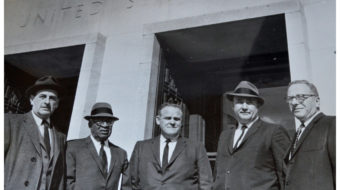
A high-level panel of academic, labor, community and business leaders released a report March 3 saying Toyota’s decision to close the New United Motor Manufacturing Inc. (NUMMI) auto plant in Fremont, Calif. March 31 goes against the firm’s business interests, and its devastating effects will ripple throughout California.
The commission producing the report, “Commitment is a Two-Way Street,” was named by California state Treasurer Bill Lockyer. Headed by Professor Harley Shaiken of the University of California at Berkeley, it includes elected officials, leaders of the Sierra Club, the Chamber of Commerce, the California Labor Federation and others.
The document skewers Toyota’s stated reasons for leaving:
• The company says General Motors’ departure from the 25-year-old joint venture after its bankruptcy last year undermined NUMMI’s economic viability. But, the report said, GM’s production represented only about 15 percent of the plant’s output over the last decade. That could easily be replaced by building more of the Corollas it sells in the U.S., or bringing in a new model.
• Toyota claims it has excess capacity in North America. But even if it ran its present plants including NUMMI at full capacity, the panel said, it would still only be able to build about 70 percent of the vehicles it expects to sell in the U.S. next year.
• The company says supply lines to NUMMI are too long. But over one-third of parts currently come from Japan – closer to California than to Toyota’s other plants in Indiana and Texas. With California accounting for nearly one-fifth of U.S. Toyota sales and 5 percent of global sales in 2007, NUMMI is also in the heart of a major market.
• Toyota claims the 48-year-old NUMMI plant is too old. But in fact it is about the same age as other highly productive auto plants, including one in Japan where Toyota makes all Corollas sold there.
Calling NUMMI “a very competitive auto plant today,” the report cited “high productivity, award-winning quality and competitive labor costs.” It said NUMMI could become even more productive by introducing hybrids and anchoring “a new green network” of advanced manufacturing.
Saying NUMMI’s “highly skilled and experienced workforce” is its most important asset, the panel warned that the workers’ “talent, skill and problem-solving ability … cannot be reproduced overnight.”
The report emphasizes the devastation NUMMI’s closing would cause to the community. Besides the 4,700 United Auto Workers members who now work there, over 20,000 work for the plant’s supply network. Replacing those jobs would cost an estimated $2.3 billion, the panel said, while the state and communities would lose nearly $1 billion in revenues in the following decade.
Closing NUMMI would really go against the grain of the company’s current ad campaign about its principles of respect for people and continuous improvement, panel chair Shaiken told a March 3 press conference. “In fact, one could say they might have to consider recalling the ad campaign in the wake of a closure on March 31.”
Lockyer called on Toyota to “step back for a moment” and realize that continuing to operate the plant would emphasize its “corporate citizenship in California and in the United States.”
Lockyer is dispatching a delegation to Japan – one of many to meet with Toyota management in recent months – and is requesting a March 8 meeting with company president Akio Toyota.
Meanwhile, the NUMMI workers’ union, UAW Local 2244, and labor and community supporters around the country, are keeping up their campaign for a boycott of Toyota vehicles if the plant closes.










